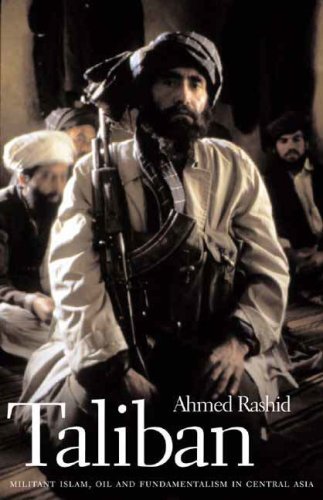
Rashid, a highly touted Pakistani journalist, begins the final chapter of his 2000 ‘Taliban’ by calling the country one of world’s ‘orphaned conflict’s’. The country would quickly change from being orphaned to a month after 9/11 being the center of global politics, as the United States uprooted the Taliban government and sent them packing, unfortunately for only a short-term vacation.
Rashid’s valuable book walks its readers through a rather dense social, religious, military, and even psychological history of the group of radicalized Pashtuns, known as the Taliban. He provides a solid regional historical overview and does not forget the many geopolitical actors involved in the fragmented country (Iran, Turkmenistan, Saudi Arabia, etc.). A solid half of the book details the violent rise to power of the Taliban as they battled first fellow Pashtun groups, than the government in Kabul, and finally the Northern Alliance actors, which would never relinquish their autonomy to Taliban-ruled Kabul and Kandahar. This book is worth reading just for those who don’t know just how fractious the Afghan society can be with many various ethnicities and sects, all with foreign partners, that have had to violently attempt to protect themselves and further their own people’s positions. This book, just like Afghanistan today, is full of conflict and violence that shows no real sign of ebbing.
 Rashid provides a telling description of the early members of the Taliban (around 1994) as Afghans born in Pakistan and raised mainly by madrassas as their parents, especially mothers, may have been lost in the years of fighting during and after the Soviet invasion and withdrawal. These young men had ‘no memories of the past, no plans for the future’ and knew of nothing else but their Taliban leaders. Like we have heard many times in reference to terrorist and gang groups, the Taliban offered these men, and boys, a meaning to their lives that they could embrace and fight for.
Rashid provides a telling description of the early members of the Taliban (around 1994) as Afghans born in Pakistan and raised mainly by madrassas as their parents, especially mothers, may have been lost in the years of fighting during and after the Soviet invasion and withdrawal. These young men had ‘no memories of the past, no plans for the future’ and knew of nothing else but their Taliban leaders. Like we have heard many times in reference to terrorist and gang groups, the Taliban offered these men, and boys, a meaning to their lives that they could embrace and fight for.
This type of camaraderie of course becomes dangerous when it is based on ignorant, stubborn, violent, yet a strong ideology and form of Islam, as they, the Taliban, surely had. The Taliban, which by 1996 controlled large swaths of Afghan territory, including Kabul, ruled with a fundamental Islamic iron fist that showed no accommodation, not even towards UN aid providers. The Taliban was controlling a large population and recruiting members with a version of Islam that ‘divested’ it of nearly all of its positive legacies, including Islamic philosophy, science, arts, civil society, etc. It was the Taliban’s way or the knife. One has never read about a more oppressive society.
The Taliban did not become the Taliban, or rule, in a vacuum. They were of course incubated and constantly nourished by the Pakistani government and ISI. When the Taliban needed more troops in their battles with Masud and what would become the Northern Alliance, Pakistan would just close some of their madrassas in FATA or the Northwest Provinces and send the men over the border. Rashid, who also spends time on Osama bin Ladin’s terrorist network in Afghanistan, accurately predicted that the Pakistani state and military were creating their own nightmare with their support of the Taliban, instead of the ’strategic depth’ they aimed for. The author stated that the Islamic fundamentalism, drugs, weapons, and social breakdown that the Pakistani government was assisting the Taliban in performing or using, was making Islamabad ‘ripe for a Taliban-style Islamic revolution.’ While what is occurring today in Pakistan is so far, thankfully, not this extreme, it is too close for comfort.
Rashid’s ‘Taliban’ also details the human and women right’s abuses by the Taliban in great detail. In addition, Rashid spends several chapters describing the ‘great game’ of pipeline politics in the Central Asia region and not surprisingly was correct in his assessment that Afghanistan, and the region as a whole, was just too unstable for Western groups to come in and build major gas and oil pipelines, no matter how much they wanted too. Though these pipeline chapters were well researched, they can be passed over by most readers.
Rashid’s book provides much more than the history and make-up of a group that the powerful United States military is having a hell of a time defeating, it brings to life the challenging modern history of a people who have only known violence in their lives. It is sad to think that one cannot imagine this changing in the near or even long-term future. Though Rashid’s work is far from perfect, too many assumptions presented as facts (he is a journalist by trade), it brings light on a dangerous and important group, geopolitical actors and actions in a key region of the world, and on the suffering of millions.